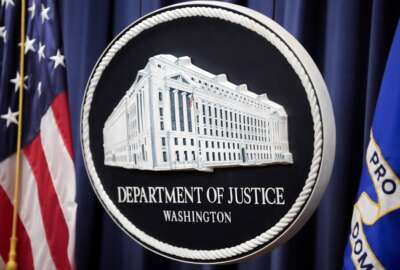Inside the Reporter’s Notebook: Some question who’s in charge at GSA with six feds on admin leave
Industry experts say GSA is looking for scapegoats for the problems outlined in two recent inspector general reports, instead of stepping back and understanding...
“Inside the Reporter’s Notebook,” is a bi-weekly dispatch of news and information you may have missed or that slipped through the cracks at conferences, hearings and the like.
This is not a column nor commentary – it’s news tidbits, strongly sourced buzz and other items of interest that have happened or are happening in the federal IT and acquisition communities.
As always, I encourage you to submit ideas, suggestions, and, of course, news to me at jpmiller@federalnewsradio.com.
The General Services Administration’s Inspector General’s report on improper management intervention during negotiations with three major federal supply-schedule contractors is causing a huge uproar across the federal community. But not because of what the IG report found. Rather because of the real and potential after-effects of the report’s findings.
First, industry sources say once again, GSA is looking for scapegoats for the problems outlined in the IG reports to place the blame on, instead of stepping back and understanding the real issues auditors raised. GSA placed one manager on administrative leave in light of the IG’s findings.
Sources say it’s not one bad actor, but an institutional shortcoming, especially around training of contracting officers.
“This report will have a huge chilling effect on the management of the schedule program,” said one industry expert, who requested anonymity because the expert does a lot of business with GSA. “Basically, the IG report assumes contracting officers never make mistakes and questions the role of senior and mid-managers, who by the way, usually are former contracting officers and hold contract warrants.”
In the meantime, multiple sources confirmed Warren Blankenship,the division director of the IT Schedule Operations, is the official put on administrative leave because of what the IG found.
Industry sources are shocked that Blankenship is being set up to take the fall for this IG report. The sources say Blankenship has been a stalwart for GSA and one of the most straight-talking managers in the Federal Acquisition Service.
And it’s not just Blankenship that GSA management is going after in the wake of what seems like the never-ending continuous investigations by the IG. GSA put five other officials on administrative leave after the IG released two reports May 15 that looked at FAS leadership conferences in Orlando and Atlanta in 2011.
Multiple sources also confirmed Steve Kempf, the acting senior procurement executive, and Amanda Fredriksen, the acting assistant commissioner for the Integrated Award Environment, were among the five who were suspended.
GSA would not confirm or deny the names of the employees put on administrative leave.
This is the second time Kempf has gotten caught up in a conference scandal. Lawmakers pointed fingers at Kempf, among many others, in their outrage over the now-infamous 2010 Western regions conference.
Requests to Blankenship, Kempf and Fredriksen for comment on their situations were not returned.
The suspension of six GSA employees over the last two weeks for past problems sets a precedent that worries many in the community. Let’s first take the IG report that says it found management intervened during negotiations with Deloitte, Carahsoft and Oracle to renew their schedule contracts.
The concern is, among people who closely follow GSA and FAS, the signal the IG report is sending to managers. If there is a problem between a vendor and a contracting officer, the IG report basically says to the contracting officer’s boss, “don’t interfere.”
In what other business situation would someone’s boss be told not to stay out of an issue directly impacting how the organization meets its mission?
Tom Sharpe, the FAS commissioner, wrote a memo to staff June 5, two days after the report came out, explaining the IG’s report and the steps his organization is taking.
“I want to offer my personal support to our contracting officers,” Sharpe wrote in the memo obtained by Federal News Radio. “There is a proper management role in supporting the FAS acquisition workforce and in overseeing our procurement process. However, I will not tolerate improper intervention in our procurement process.”
Sharpe said he “will issue an Instructional Letter to all FAS employees that will address how contracting staff should document stakeholder (management, professional association, Congressional or other) interest in a particular contract action. As always, staff should refer incoming inquiries from members of Congress to the GSA’s Office of Congressional and Intergovernmental Affairs (OCIA).”
A GSA spokeswoman said instructional letters are typically issued to give further guidance or information to the workforce.
“We are reviewing current policy and guidance already in place and anticipate issuing an IL to further address documentation requirements for communication and correspondence throughout the acquisition process,” the spokeswoman said.
But what Sharpe is doing, according to some, is furthering the chill the IG report put on management and contracting officer interactions.
“Where do contractors go if they have a problem with the contracting officer?” the industry source asked. “It’s clear to many of us that the IG is in control and the balance is gone.”
The agency spokeswoman said contracting officers do require management support and oversight, but also have a large degree of independence in their contracting decisions.
“The report, and the related GSA policies, should not be interpreted as an indication that there is to be zero management involvement in the activities of our contracting officers,” the spokeswoman said. “Managers are part of the team and need to ensure roles and responsibilities throughout the process are clearly defined.”
She added managers play a vital role in ensuring contracting staff have the skills, training, support and resources they need to do their job. As for the two IG reports on conference spending, industry sources are flabbergasted to why Kempf and Fredrickson are among those at the center of the punishment.
Kempf has been a good solider through his career at GSA. He returned after a brief medical leave last fall to assume the role of senior adviser and eventually acting senior procurement executive.
The IG report highlights systemic problems across the agency that GSA officials say have supposedly been fixed.
The question many have raised is, why is GSA looking to punish more people instead of ensuring procurement oversight and the use of conferences are appropriate?
The IG’s findings show major problems and a waste of more than $200,000. The better thing to do would be to make sure systems are in place, including training and oversight by management — both of which, by the way, tags back to the management interference IG reported — to ensure better decisions are made in the future.
Placing blame or punishing GSA employees may have the opposite effect of accomplishing the goals current agency leaders have set out for the agency.
Oh, and the irony to all of this: Fredrickson has been playing a major role in ensuring the System for Award Management (SAM) continues on the right track, but without her oversight, there was a major coding error that created a bit of confusion for all SAM vendors, who initially were asked to re-input their address data for each contract.
A GSA spokeswoman said SAM users detected a problem with the May monthly extract files where commas from a number of fields, including the legal business name and the physical address, were removed.
“Vendors will not be required to do any modifications. GSA is performing internal fixes — both at SAM and at the eMod systems to correct the error. Notifications to vendors are forthcoming,” the spokeswoman said. “To address this issue, the SAM PMO created a new May monthly refresh file with the errors corrected, which was posted at 2 p.m. on June 5. The issues associated with the monthly files did not affect any of the SAM.”
After 36 years at the Office of Management and Budget, Jack Kelly is calling it a career.
In an email to friends and colleagues, obtained by Federal News Radio, Kelly, a senior policy analyst in the Office of Federal Procurement Policy, announced he is leaving government on July 4.
Most recently, Kelly has been a major force behind the administration’s strategic sourcing efforts. But being at OMB since 1977, Kelly has seen a lot of change during his career.
“I worked closely with Jack throughout my tenure as administrator, primarily on strategic sourcing,” said Dan Gordon, a former OFPP administrator. “Jack brought three great qualities to his work on strategic sourcing: first, enthusiasm about and focus on improving the way the government buys; second, fascination with good, detailed data, almost to the point of obsession, and a burning desire to ensure the government got, and used, full and current data in its buying practices; and third, deep knowledge of the General Services Administration, including its strengths and weaknesses, gained from his years working on GSA for OMB.”
In addition to strategic sourcing, Kelly played key roles in coordinating governmentwide reforms of the management of federal real estate, travel, non-military aircraft, motor vehicles, personal property and mail service.
As an OMB budget examiner for GSA, Kelly’s analysis led to the consolidation of GSA’s policy and regulatory activities into a single Office of Governmentwide Policy and GSA’s citizen-facing activities into a single Office of Citizen Services.
Out&About:
There are plenty of good hearings this week, starting with Thursday’s House Small Business Committee’s hearing on strategic sourcing, where Joe Jordan, the administrator of the Office of Federal Procurement Policy, and Jeff Koses, GSA’s director of acquisition operations for the Federal Acquisition Service are among those testifying.
The House Oversight and Government Reform Committee will look at suspension and debarment Wednesday. The witnesses include former OFPP administrator Angela Styles and Project on Government Oversight’s Scott Amey.
And AFCEA Northern Virginia’s chapter hosts a luncheon where Alfred Riveria, the Defense Information Systems Agency’s vice director of strategic plans and information in the office of the Strategic Business Development Executive.
OTHER ENTRIES IN THE “REPORTER’S NOTEBOOK” SERIES
May 28 — Reverse auctions for IT, DHS answers not satisfying, contractor salary cap proposal returns
May 13 — The CIO shuffle continues, the last E-Gov benefits report
April 29 — Communication breakdown over FITARA, lawmaker wants answers from DHS
Copyright © 2024 Federal News Network. All rights reserved. This website is not intended for users located within the European Economic Area.
Jason Miller is executive editor of Federal News Network and directs news coverage on the people, policy and programs of the federal government.
Follow @jmillerWFED






